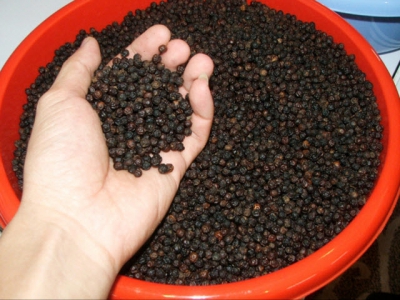Pepper industry makes five recommendations to overcome difficulties amidst pandemic

The ideas stem from the prolonged Covid-19 pandemic, which is expected to have a significant effect on pepper companies' export operations.
Despite difficulties, it is expected that in 2021, the pepper industry will still strive to bring in an export turnover of USD850 million (up 28% compared to 2020). Therefore, it is necessary that the Government, ministries, and units pay attention to direct and support pepper businesses, in the context of the prolonged Covid-19 pandemic. Photo: TL.
According to the Vietnam Pepper Association (VPA), drastic measures to prevent and combat Covid-19 have been incorporated into businesses' burdens, including the "three on-sites" motto and negative Covid-19-testing certificate for travel, which means they must pay testing fees and provide equipment for laborers to work and live "on-site."
Congestion at the port and a container scarcity have created ideal circumstances for shipping companies to manipulate surcharges and freight prices. Shipping prices have increased tenfold since the end of last year and show little signs of easing.
As a consequence, many companies are on the verge of bankruptcy. However, in order to maintain market share and reputation, businesses are compelled to fulfill contracts at a loss for each export order.
Vietnam Maritime Administration hosted a virtual meeting in early August with commodity organizations and shipping lines to address the recent increase in sea freight prices. To solve the issues, official institutions such as the Ministry of Transport and the Vietnam Maritime Administration must take more severe steps to curb in shipping lines' rate manipulation and excessive price hikes.
Although the recent increase in pepper prices has cheered farmers, VPA believes that raw material costs are beginning to rise. With the present pricing, investing in pepper gardens remains a challenge for families with limited financial means. If farmers borrow for the goal of reinvesting and anticipate fortune-telling in three to four years, the potential for risk is very large, especially when market swings and weather effects are unpredictable.
To resolve the issues, VPA made the following five recommendations to the Government:
To begin, the Covid-19 pandemic is set to continue longer and have a greater effect on companies' export operations, which are now sluggish owing to circulation to travel restrictions. In the near future, the government must progressively open up to regions and cities that have administered one or two doses of vaccine, allowing economic activity to gradually resume normalcy. Priority is given to workers of businesses engaged in manufacturing and transportation in order to guarantee the continuity of the supply chain of products.
Second, the Government must have a strategy in place to assist companies and farmers by reducing corporate income tax due in 2021 and the first six months of 2022.
Third, offer financial assistance to businesses that participate in local and international trade promotion initiatives. Increased marketing of Vietnam's main goods via commercial representatives and Counselors in other countries.
Fourth, for the pepper industry, the MARD should immediately direct the Department of Crops to report on the area and output of pepper across the country, so that businesses can develop appropriate business plans and make recommendations in a timely manner, given the possibility that the area may expand and the pepper industry's crisis is likely to recur as the price of pepper increases.
Fifth, it is recommended that the Government and its ministries and branches publish a Circular directing the execution of the Government's Resolution 105 of September 9, 2021, on assisting businesses, cooperatives, and business families in the event of a Covid-19 pandemic.
According to VPA, owing to the impacts of climate change in 2020, as well as the price of pepper continuing to fall too low from 2017 to 2020, individuals have reduced investment and attention, resulting in a 25% reduction in Vietnam's pepper output this year compared to 2020. The world's pepper producing nations, including Brazil, Indonesia, Malaysia, and India, will likewise decrease production in 2021 as a result of climate change.
Vietnam exported approximately 197,000 tons in the first eight months of 2021, generating USD 657.8 million in revenue. When compared to the same time in 2020, export volume dropped by 2%, while revenue rose by 48.3 percent.
The reduction in supply resulted in a significant rise in export prices over the previous year. Vietnam's exports are projected to total 240,000 tons in 2021, with a revenue of USD 850 million; compared to 2020, the export volume will decline by 15%, while revenue will rise by about 28%.
Additionally, the VPA said that the present supply is restricted since pepper is produced in a few countries such as Vietnam, Brazil, Indonesia, India, Cambodia, and Sri Lanka, with Vietnam accounting for 40% of world pepper production. These are the circumstances under which we may anticipate pepper prices continuing their upward trend in the near future.
Có thể bạn quan tâm
 Approximately 100% of China’s dragon fruit imports from Vietnam
Approximately 100% of China’s dragon fruit imports from Vietnam China is the largest consumer of dragon fruits in the world and nearly 100% of China’s dragon fruit imports come from Vietnam.
 Agriculture sector is committed to meeting the USD 44 billion export target
Agriculture sector is committed to meeting the USD 44 billion export target Deputy Minister of MARD Phung Duc Tien believed that Resolution 105 will act as a lever to assist the agriculture sector in reaching USD 44 billion export goal
 Vietnamese farmers are keenly interested in digitization
Vietnamese farmers are keenly interested in digitization A survey conducted by CropLife Asia in four ASEAN countries shows that Vietnamese farmers' interest in digitization is at a much higher rate than the rest.